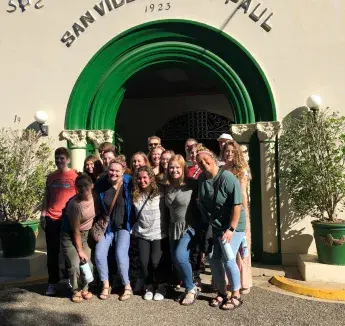
Service-Learning
Service-Learning in Santiago
Encuentro Dominicano students spend two hours on Mondays and Wednesdays working alongside Dominican agencies at local service sites. Encuentro service site partners may vary each semester with the limits of availability, but partner sites have included organizations that work with children, teenagers and elder adults living in challenging circumstances. Examples of service partners include:
Hospicio is one of the few elderly/hospice care facilities in the Santiago area. Hospicio is a community for more than 70 elderly individuals. Many of the individuals at Hospicio lack friendships and relationships with others and students who engage in this option for their service work will spend a great deal of time interacting with the members of the community. Students will also be expected to assist with organizing recreational activities for the elderly.
Hogar Luby was founded in 1991 as a privately-run home for children and adults with disabilities. In 2005 it was taken over by CONANI, a governmental organization that works specifically with children (ages infant-18) in the Dominican Republic. There has been much speculation about exploitation and scandal under the initial ownership and management. Since the time that CONANI took over, the home has seen many changes. These changes include better general treatment of residents, cleaner living conditions, more organization and higher payment for employees. Since CONANI started running the organization, the government donated the lower level of the original building. The extra physical space is great for the residents and provides the children with the opportunity to be outside. Under the old management, families had to pay for their loved ones to live in the home. Now, under government control, the services are free. There is a physician who comes to check on the residents Monday thru Friday, and is on call on the weekends for emergencies. Walking into CONANI can be a difficult experience for some and the discovery of a joyful place for others, where children with extreme disabilities as well as children who are fairly functional receive care. CONANI is seriously under-funded and while the staff will keep a child alive, there is very little physical, psychological and speech therapy, as well as other opportunities for growth and development more typical in developed-nations.
Acción Callejera is an organization that works with children who are on the streets in Santiago. Many of the children at the center have dropped out of school to make a living on the streets, shining shoes or washing car windows. They are a very vulnerable population whose rights are often neglected. Acción Callejera provides a variety of services to these children—counseling, homework help, meals, showers and recreation. They also work heavily in prevention because it is much more difficult to rehabilitate children accustomed to the rough life on the streets than it is to prevent children from leaving their homes and schools in the first place. Students who volunteer at this site will help the children in the areas where it is most needed, such as homework help, teaching English, or recreation. There are also possibilities of creating and implementing new programs with the approval of the director of the organization.
Red de Misericordia is a large orphanage that is run by a faith-based NGO. There are more than 100 children, ages 0-18 who reside there. The children come to Red de Misericordia referred by the government either because they are orphans or because they have been removed from their families. Children are provided with housing, education and a faith community at Red de Misericordia. Expectations: Students who select this service site will be assisting in the orphanage’s own school. Activities include teaching/tutoring English and/or Math, playing with the kids, doing crafts and other extracurricular activities.
Cáritas is a before, after or in lieu of-school meal program for children (mostly toddlers) who are poor in the Santiago area. Cáritas Cienfuegos and Licey are 2 of around 10 centers throughout the city. Children who don’t have enough food at home do not function at school, so Cáritas feeds between 20-50 children daily at each center in order for them to attend school with a full stomach. During the 2019-2020 academic year, Cáritas Licey transitioned to being a fully functioning pre-school/kindergarten. Students who volunteer at this site will assist with reading to children, playing, serving food, and helping to clean up.
The Flor del Campo school belongs to an NGO called Fundación Monumento Viviente, and it serves more than 400 children from families with low income in the Licey area. It is a K-8th school, offering a Catholic education to children who would otherwise not have access to it. Primarily, students who volunteer at this site will be teaching English and other classes based on their backgrounds/interests. Others may accompany the teachers as the school’s director so determines.
The Nuñez Molina school is located in the low-income suburb of Licey al Medio. It is a small K-7th school, trying to implement a wholesome education for their students, who may come from families with low educational backgrounds. Primarily, students who volunteer at this site will be teaching English and other classes based on their backgrounds/interests. Others may accompany the teachers as the school’s director so determines.
When Will You Encuentro?










